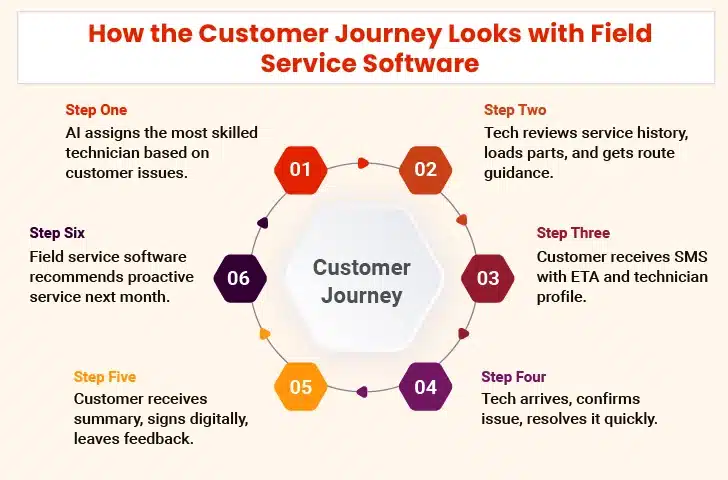In times of an economic downturn, the quality of service delivered by the field representatives plays a crucial role in customer retention and loyalty. When customers are satisfied with your field service, they are more likely to leave better ratings and positive reviews, establishing the much-needed trust in your business, and also recommending it to others. Thus, unparalleled customer experiences through consistent customer services, irrespective of channels, have become a major differentiator in competitive markets.
Table of Contents
How Is Field Service Redefining Customer Loyalty?- 1. Shrinking Workforce, Rising Pressures
- 2. The Case for Connected Data
- 3. AI as a Field Service Multiplier
- Better Performance
- Expert Scheduling
- AI and Generative AI-Driven Personalization
- Mobile Accessibility
- Real-Time Communication
- Improved Visibility
- Optimized Inventory Management
- Task Automation
- Unified User Experiences
How Is Field Service Redefining Customer Loyalty?
Field service is undergoing a powerful transformation. It is no longer a back-office function focused on dispatching technicians and closing tickets. It’s becoming a frontline of brand trust, a driver of customer loyalty, and a differentiator in competitive markets. Today’s customers expect field service to be fast, personal, and frictionless, and they’re holding companies accountable for delivering it. According to Salesforce’s State of Service report, 74% of mobile workers say customer expectations are higher than ever, while 73% report an increased demand for personalized interactions. These expectations are rising even as the number of qualified mobile workers is shrinking, and workloads are intensifying. So, what does this mean for field service organizations aiming to stay ahead?1. Shrinking Workforce, Rising Pressures
The field service talent pool is becoming increasingly competitive. Applications from young people entering skilled trades have fallen by nearly 50%, while seasoned technicians are steadily retiring. As a result, companies are asking more from fewer mobile workers, and it’s taking a toll. 57% of mobile workers report experiencing burnout, creating a dangerous feedback loop of overwork, stress, and poor customer experience. Field agents are often the only face of your company that customers ever meet. This means every site visit is a brand encounter. With more extended workdays and higher stakes, organizations must equip technicians with tools that help them operate smarter, not just harder.2. The Case for Connected Data
One of the most effective ways to support stretched field teams is through connected data. Salesforce found that mobile workers currently spend just 32% of their time engaging with customers; the majority of their time is lost to administrative tasks, screen toggling, and searching for information. With a mobile CRM app that integrates service history, product details, and customer interactions, field representatives can arrive informed and ready, without needing to bounce between screens or departments. This streamlined data access enhances speed and professionalism, unlocking true personalization in the field. It enables technicians to anticipate needs, recall preferences, and suggest relevant upgrades instantly. Connected data isn’t just about customer insights. It also enables more innovative logistics, such as route optimization, real-time rescheduling, and even drone-assisted inspections. These tools reduce technician stress, cut fuel usage, and increase appointment volume without overburdening staff.3. AI as a Field Service Multiplier
Artificial Intelligence is no longer a futuristic idea in field service. It’s already transforming how top-performing companies deliver. According to a Salesforce report, 79% of service organizations are investing in AI, and 83% of decision-makers plan to increase that investment in the coming year. AI can summarize service histories, predict part failures, schedule tasks based on traffic or technician skills, and even generate personalized responses to customer inquiries. By automating these tasks, mobile workers are freed up to do what they do best: deliver exceptional in-person service. And that’s not all. AI-driven upsell recommendations can turn service calls into revenue opportunities. Suppose a technician knows the last three service calls involved the same recurring issue. In that case, they can proactively recommend a product replacement or a new service tier, thereby enhancing both customer satisfaction and company profitability.What Is Field Service Management Software?
Field service management software (FSM) is a SaaS-based tool designed to optimize and automate the work performed by field service workers, including mobile technicians, dispatchers, and agents. It guarantees that no employee has to compromise the functionality of the services they provide while working outside the office. A Salesforce-powered field service management solution helps you avoid mistakes and enables your field service technicians to perform their jobs effectively. By implementing next-generation technology, including Salesforce Field Service Lightning-based UIs, you can reap immense benefits that will be directly reflected in improved service quality.What Are the Key Advantages of Salesforce Field Service Management Software?
Salesforce’s field service management software helps assign the right technician with the right tools at the right time. It streamlines tasks like scheduling, dispatch, and invoicing. With AI and mobile access, teams work smarter and respond faster.I. Better Performance
Many companies assign agents to the field for tasks, such as renovations, installations, routine maintenance, and professional services. Nevertheless, a majority of businesses still use manual ways to handle their field agents. Managing a company’s field operations is a time-consuming and tiring job. You are required to track and locate the workers manually if one customer does not get serviced on schedule, or the employee was sent to the wrong place. With the help of field service management software, your agents can use their field time in the most optimum manner with the help of schedule optimization. The software connects work orders with contacts, accounts, cases, assets, and other elements that you entered as data in the CRM systems.II. Expert Scheduling
Salesforce’s field service software schedules visits based on technician skills, availability, and travel distance. It avoids guesswork and late arrivals. As a result, customers receive appointments on time. On-time visits show respect and build trust. All in all, accurate scheduling sets a professional tone from the start. This level of reliability feels almost luxurious in a market that is shrinking. When customers get neat, timely, and knowledgeable service, they feel confident. Field service software reduces anxiety and uncertainty. It also reduces follow-up calls and missed appointments. This lowers costs and shows commitment. Each successful first visit strengthens loyalty and sparkles like a rare gem.III. AI and Generative AI-Driven Personalization
Salesforce’s Einstein Understand patterns in service data and predict what customers might need next. It prompts technicians to carry certain parts before arriving. It also suggests tailored messaging after the work is done. Generative AI brings a human-like, conversational tone to automated notifications. Imagine a follow-up text that feels crafted just for you. “Hi, Ms. Smith, your AC unit was serviced today. Let us know if you need a freon check next.” That tiny detail shows that clients’ satisfaction matters. They feel heard and appreciated. AI also drafts technician reports in plain language with photos and clear summaries. That saves time and makes the service transparent. Customers see what was fixed, why, and how. This builds trust brick by brick, turning routine service into a loyalty magnet.Discover how our solution can streamline your field operations. Connect with our experts now
IV. Mobile Accessibility
As field service management solution is cloud-based software, you don’t have to worry about the device being used or the location and the number of connected users. If you are connected to the Internet, you can easily access the data and functionality that you are authorized to access. As data is always synchronized in real time, the field agents can collect important information from the mobile application in case they do not have access to the Internet. When the Internet connection is reestablished, the entire recorded data can be synchronized with other platforms. Here’s how mobile accessibility benefits customers:| Mobile Feature | How It Benefits Customers |
|---|---|
| Access to full-service history | Customers don’t have to repeat themselves |
| On-site job checklists | Ensures tasks are done on time |
| Photo capture and signatures | Helps maintain transparency in service records |








